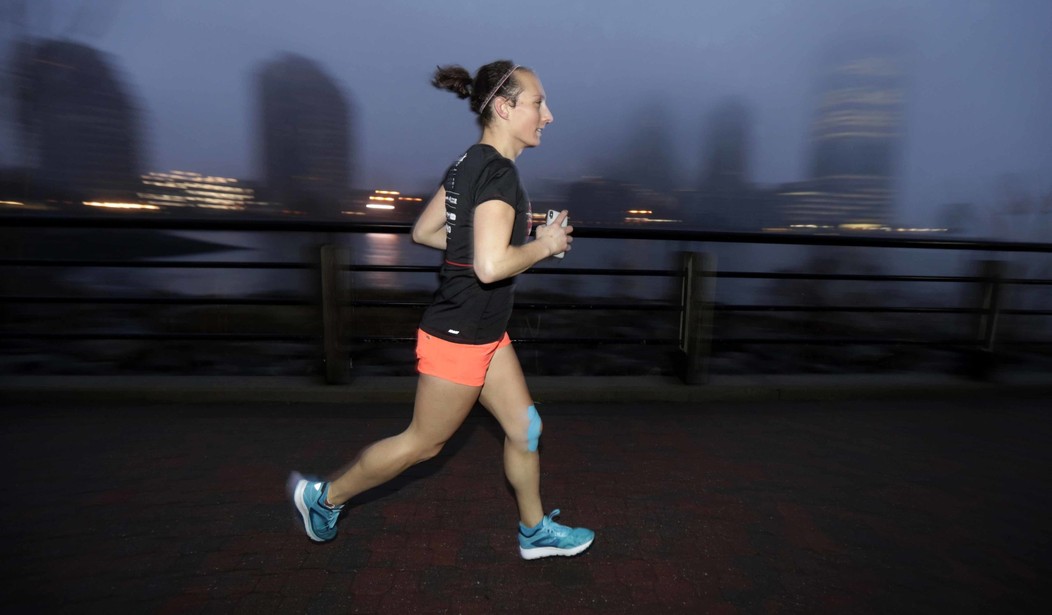Next Tuesday, thousands will compete in the Boston Marathon, a race that became more famous after the 2013 bombing. This year, race officials announced that runners who identify as transgender will be able to race against members of the opposite sex, a policy that allows men who identify as women to have an unfair advantage in the women’s race.
At least one runner who will compete against women has not even taken any drugs to counteract his testosterone. Another actually took more testosterone in the past, and it remains unknown if he has taken any drugs to counteract his natural advantage.
“We take people at their word. We register people as they specify themselves to be,” Tom Grilk, chief of the Boston Athletic Association, said in a statement. “Members of the LGBT community have had a lot to deal with over the years, and we’d rather not add to that burden.”
At least five biological men who claim to be women will compete in the race, the Associated Press reported. One of them, Stevie Romer, explicitly said he has not altered anything about his sports physique as a man to become more feminine. “Although she hasn’t done anything to lower her testosterone levels, Romer legally changed her gender, grew her hair out and started living openly as a woman more than a year ago,” the AP reported.
Romer’s refusal to handicap himself physically means that he will enter the race with all the biological advantages of a male, despite racing against women.
According to LiveStrong, “the gender gap in athletic performance, as shown in records from Olympic competition, has remained stable since 1983. The mean difference has been about 10 percent between men and women for all events.”
“The mean gap is 10.7 percent for running, 8.9 percent for swimming and 17.5 percent for jumping. When performances improve, the improvements are proportional for each gender,” the sports site reported. While well-trained women can beat unfit men, there is a natural advantage to being male. This advantage arguably persists even when a transgender “woman” takes drugs to block testosterone.
For these reasons, Olympic officials issued new rules in 2016 saying transgender “women” can only compete with other women if their testosterone levels stay beneath a certain limit.
Interestingly, some LGBT activists have dismissed the persistent gender gap in sports as a “myth.” Dr. Alex Keuroghlian, director of education and training programs at the Boston LGBT health and advocacy center Fenway Institute, insisted that if transgender “women” lower their testosterone levels, they have no athletic advantage over biological women.
“That’s a misconception and a myth,” Keuroghlian told the AP. “There’s no physiologic advantage to being assigned male at birth.”
Notice the subversion — the LGBT doctor insisted that being a biological male is reducible to “being assigned male at birth.” In reality, if a human being is born with an X and a Y chromosome, that male will develop differently throughout life.
“Thanks in large part to testosterone, men are generally heavier and taller than women,” explained David Epstein, author of “The Sports Gene: Inside the Science of Extraordinary Athletic Performance.” Men “have longer limbs relative to their height, bigger hearts and lungs, less fat, denser bones, more oxygen-carrying red blood cells, heavier skeletons that support more muscle — 80 percent more in the upper body… — and narrower hips that make for more efficient running and decrease the chance of injury.”
Considering the breadth of these general differences, testosterone blockers taken later in life should not be expected to erase them. Even so, transgender hormone “treatments” and surgery can balance the scales somewhat.
The AP included the story of Amelia Gapin, a man who has taken testosterone blockers to confirm his transgender identity. “When taking testosterone blockers, her pace dropped by more than a minute per mile,” the AP reported. “Later she underwent surgery and had to take months away from training to recover.” It took Gapin three years to qualify for the marathon.
Even after this regimen, however, Gapin is biologically male and went through puberty as a male. He still has biological advantages over the women against whom he will race.
Erin Taylor, another man (a former Marine and the identical twin of an All American runner) identifying as a woman who will race in the Boston Marathon, actually took more testosterone in the past. In 2010, Taylor discovered his gender dysphoria after his body rejected extra testosterone prescribed by his doctor in a health scare. No outlet has yet reported whether Taylor has taken testosterone blockers or made any other attempts to even the playing field before the marathon.
In recent years, transgender athletes have grabbed headlines by winning athletic competitions. In 2016, an Alaska boy identifying as a girl defeated girls in track. Last year, a freshman boy in Connecticut won two state championship races against older girls — when he would have taken last had he competed against boys. Last month, a Texas girl taking male hormones to confirm her transgender identity defeated other girls in wrestling.
While gender dysphoria — the persistent condition of identifying with the gender opposite one’s biological sex — is a real condition, transgender identity and the hormonal and surgical attempts to “affirm” that identity are contrary to DNA and arguably dangerous.
Many men and women who once identified as transgender and who took hormones or had surgery to affirm that identity later regretted their actions. A 21-year-old Oregon woman who once identified as a man said that such measures are “not a cure at all.”
Even so, if transgender athletes are to compete against members of the opposite sex, it stands to reason that some proof of fairness should be required.
The Boston Marathon organizers have not only opened the doors to transgender athletes, including transgender “women” who have not taken drugs to balance the scales, but they will not even ask registrants whether they are transgender or not.
Organizers in other cities, such as Chicago, New York City, London, and Los Angeles, have confirmed that their marathons will also accept transgender runners, without confirmation required. “We want to be inclusive and sensitive to all of our participants,” Carey Pinkowski, Chicago Marathon executive race director, told the AP. “At this point, we don’t feel that we need to require legal or medical records or anything along those lines.”
While these are amateur races, they do require athletes to qualify in order to compete. Do these cities really want to literally turn a blind eye to arguable unfairness?









Join the conversation as a VIP Member